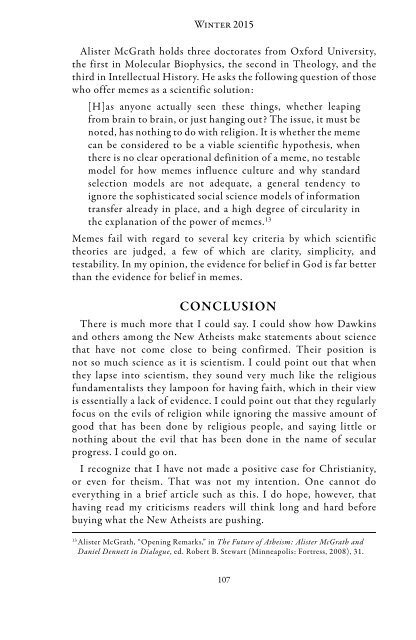THE CITY
h6c7p5d
h6c7p5d
You also want an ePaper? Increase the reach of your titles
YUMPU automatically turns print PDFs into web optimized ePapers that Google loves.
Winter 2015<br />
Alister McGrath holds three doctorates from Oxford University,<br />
the first in Molecular Biophysics, the second in Theology, and the<br />
third in Intellectual History. He asks the following question of those<br />
who offer memes as a scientific solution:<br />
[H]as anyone actually seen these things, whether leaping<br />
from brain to brain, or just hanging out? The issue, it must be<br />
noted, has nothing to do with religion. It is whether the meme<br />
can be considered to be a viable scientific hypothesis, when<br />
there is no clear operational definition of a meme, no testable<br />
model for how memes influence culture and why standard<br />
selection models are not adequate, a general tendency to<br />
ignore the sophisticated social science models of information<br />
transfer already in place, and a high degree of circularity in<br />
the explanation of the power of memes. 13<br />
Memes fail with regard to several key criteria by which scientific<br />
theories are judged, a few of which are clarity, simplicity, and<br />
testability. In my opinion, the evidence for belief in God is far better<br />
than the evidence for belief in memes.<br />
CONCLUSION<br />
There is much more that I could say. I could show how Dawkins<br />
and others among the New Atheists make statements about science<br />
that have not come close to being confirmed. Their position is<br />
not so much science as it is scientism. I could point out that when<br />
they lapse into scientism, they sound very much like the religious<br />
fundamentalists they lampoon for having faith, which in their view<br />
is essentially a lack of evidence. I could point out that they regularly<br />
focus on the evils of religion while ignoring the massive amount of<br />
good that has been done by religious people, and saying little or<br />
nothing about the evil that has been done in the name of secular<br />
progress. I could go on.<br />
I recognize that I have not made a positive case for Christianity,<br />
or even for theism. That was not my intention. One cannot do<br />
everything in a brief article such as this. I do hope, however, that<br />
having read my criticisms readers will think long and hard before<br />
buying what the New Atheists are pushing.<br />
13<br />
Alister McGrath, “Opening Remarks,” in The Future of Atheism: Alister McGrath and<br />
Daniel Dennett in Dialogue, ed. Robert B. Stewart (Minneapolis: Fortress, 2008), 31.<br />
107


